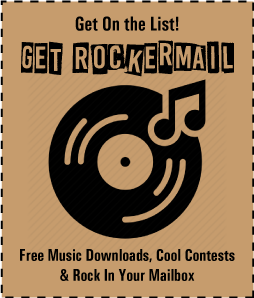Another trick we learned was to go to an all you can eat place and have one guy go in alone and buy one plate. He’d eat until he was full then wave in the next guy, give him his plate and he’d eat until he was full, wave the next guy in and so on. That would work until the salad bar narc finally got hip.
A lot of times we didn’t know if we’d have enough gas money to get us to the next town. We literally begged people for food and sweet talked mechanics into fixing our van when it broke down. We were glorified panhandlers, flat out broke most of the time, but swallowing our pride and resigning ourselves to survive by any means necessary was just something you did. We couldn’t afford to act like we were God’s gift.
So, how is it different today? The big difference now, of course, is the internet and the technology at bands’ disposal. It has revolutionized everything and empowered indie bands everywhere. With a mobile network, laptop, and printer, you can make CDs, stickers and t-shirts from the back of your van, and consequently you can actually make some money while on the road. With Facebook, Twitter and YouTube you can get the word out about gigs, post live clips, release new downloadable songs anytime you like – self-promoting with little or no overhead cost.
It’s a new world now with bands finding alternative ways to get the word out. Some are still hitting the highways like always and some are “touring” virtually by monetizing its videos on YouTube. Take Pomplamoose and OK Go who both had videos go viral on YouTube. “Our goal is to be a self sustaining business,” Pomplamoose’s Jack Conte says. “Our artistic goal is to be able to make music that we like for the rest of our lives.” While Pomplamoose isn’t aiming to jump to a label, OK Go got signed to EMI, but they are now being called a failure because they’re latest release is not selling enough units.
This is the danger of living by other people’s definition of success, especially a major label’s. OK Go would do well to wrestle back control of their career and go completely indie again. Being tied to a major label, there is only one goal – cash. It’s not that you can’t have artistic goals on a major label. The problem is, major labels don’t give you a grace period to cultivate your career anymore. The cold reality is unless your debut sells a ton, you’re history. Name the last band signed to a major label that was afforded the opportunity to come into their own over the course of three records?
Not that going indie is easy. Amanda Palmer’s campaign to be liberated from her ex-label, Roadrunner Records, garnered a lot of controversy and her motives came into question. What can’t be questioned is her innovation and utilization of all mediums at her disposal. She plays random secret shows for her Twitter followers, does YouTube videos in backs of taxi cabs, and has forged a fanatically devoted relationship with her fans. “I don’t do this to make money,” she says. “I don’t do this to win approval. I do this to make art, to feel connected.” She brought a troupe of back-up actors/dancers on tour and had no money to pay them, so she passed a hat into the crowd every night and the fans took care of them, brought them dinner and gave them places to sleep. “All sans label, all using email and twitter,” she says. “The fans followed the adventure. They loved helping.” Twenty-five years later, the original idea of creating a community, paying it forward and forging an intimate relationship with fans endures. It’s a timeless relationship between patron and artist. Being ‘indie’ strengthens that relationship with direct contact rather than diluting it through a label.
So, is it easier or harder now to make it? Well, the answer is, “making it” has been redefined. Sure, if flying around in Leer jets is your standard of success, well, not much has changed. That takes big capital behind you, a lot of luck and, oh yeah, it helps to have the goods. Basically it comes down to motives. If making music to you is art and a source of salvation and sustenance, going indie is a true viable option now. What has happened the last 10 years is the full maturation and modernization of the original D.I.Y. indie credo – eliminating the middle man – no longer having to be reliant on record labels, radio stations and traditional media outlets. Going indie is not just some middle finger to corporate America. If you’re web savvy, committed, and believe success is relative and something you define for yourself, it can be a sound business choice.
We’ll see where we are in 10 years as bands continue to evolve the new paradigm of touring, weaning themselves from reliance on labels and reestablishing an intimate connection with the audience. Being snubbed by my idols when I was 15 inspired me to go find new heroes I could relate to. Funny thing was, Black Flag, Husker Du and the Replacements didn’t want to be anyone’s heroes. They just said, “Let’s go this way.” And so we did. And others will continue to. For the love of music and because it hurts too much not to.
This article was printed by permission of the author.
Bill See is the author of: 33 Days: Touring In A Van. Sleeping On Floors. Chasing A Dream.
http://www.33daysthebook.com/




